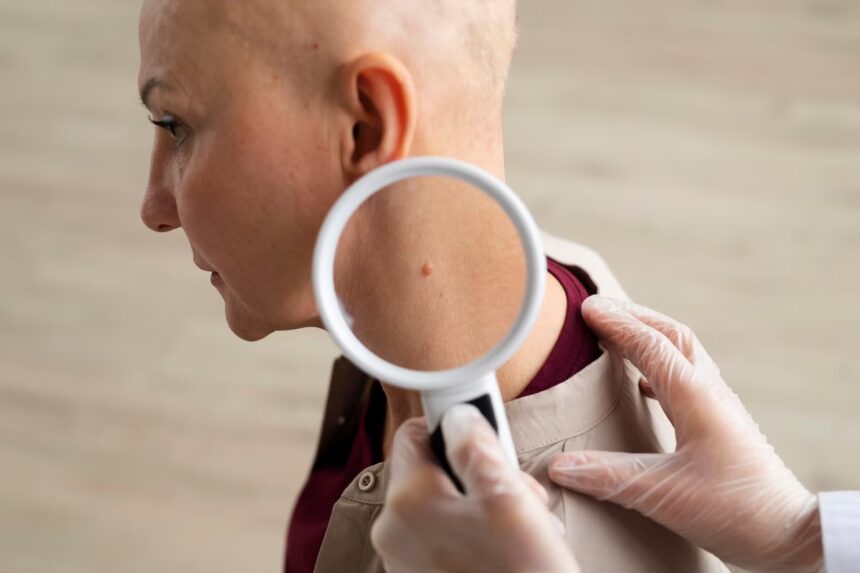Skin cancer is one of the most common types of cancer worldwide, and South Africa is no exception to this concerning trend. With its abundant sunshine and outdoor lifestyle, South African women are at a higher risk of developing skin cancer. However, by taking proactive steps to prevent and manage this disease, women can protect their skin and maintain their overall health. Here is some valuable advice for South African women to prevent and manage skin cancer effectively.
- Sun Protection Is Key:
Protecting your skin from the sun’s harmful ultraviolet (UV) rays is the cornerstone of skin cancer prevention. South African women should take precautions, especially during the peak hours of intense sunlight between 10 am and 4 pm. Here are some essential sun protection measures:
- Wear protective clothing: Opt for lightweight, long-sleeved shirts, long pants or skirts, and broad-brimmed hats that shade your face, neck, and ears.
- Apply sunscreen: Use a broad-spectrum sunscreen with a sun protection factor (SPF) of 30 or higher on exposed skin, including your face, arms, and legs. Reapply every two hours, or more frequently if you’re swimming or sweating.
- Seek shade: Whenever possible, stay in the shade, especially during the sun’s strongest hours.
- Wear sunglasses: Choose sunglasses with UV protection to shield your eyes and the delicate skin around them from harmful rays.
- Perform Regular Skin Self-Examinations:
Early detection plays a crucial role in managing skin cancer. South African women should get into the habit of performing regular self-examinations to monitor their skin for any changes or suspicious moles. Follow the ABCDE rule for identifying potential warning signs:
- Asymmetry: One half of the mole or lesion doesn’t match the other half.
- Border irregularity: The edges are uneven, scalloped, or poorly defined.
- Color variation: The color may be uneven, with different shades of brown, black, or tan.
- Diameter: The size of the mole or lesion is larger than 6 millimeters (about the size of a pencil eraser).
- Evolving: The mole or lesion is changing in size, shape, or color over time.
If you notice any of these signs or any other concerning changes, consult a dermatologist for a professional evaluation.
- Seek Professional Skin Examinations:
Regular skin examinations by a dermatologist are essential, especially if you have a family history of skin cancer or significant sun exposure. A dermatologist can identify suspicious moles or lesions that may require further investigation or treatment. They can also provide guidance on how often you should undergo professional skin examinations based on your individual risk factors.
- Be Mindful of Tanning:
While a tan may be seen as desirable in some cultural contexts, it is important to remember that tanning is a sign of skin damage. Both natural and artificial tanning can increase your risk of developing skin cancer. South African women should avoid tanning beds and sunlamps altogether. Instead, embrace your natural skin tone and focus on maintaining its health and vitality.
- Stay Informed and Educate Others:
Keeping up with the latest information on skin cancer prevention and management is crucial. South African women should stay informed about the risks associated with sun exposure, the importance of early detection, and the available treatment options. Share this knowledge with friends, family, and community members to raise awareness and promote a sun-safe culture.
- Adopt a Healthy Lifestyle:
Maintaining a healthy lifestyle can contribute to overall skin health and reduce the risk of skin cancer. South African women should:
- Quit smoking: Smoking can increase the risk of various types of cancer, including skin cancer. Seek support and resources to quit smoking if needed.
- Eat a balanced diet: Focus on a diet rich in fruits, vegetables, whole grains, and lean proteins. These nutrient-rich foods support overall health, including skin health.
- Stay hydrated: Drink plenty of water to keep your skin hydrated and maintain its natural elasticity.
Conclusion:
Preventing and managing skin cancer requires proactive measures, regular self-examinations, professional evaluations, and a commitment to sun protection. By adopting sun-safe habits, staying informed, and maintaining a healthy lifestyle, South African women can significantly reduce their risk of developing skin cancer. Prioritizing skin health empowers women to protect themselves and enjoy the beautiful South African outdoors with confidence and peace of mind.










